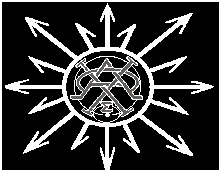
TGT-ULC Article
Gnostic terminology has long been used in the field of
psychology and in theology. Why couple Gnosticism, which is highly
approachable, with the difficult and complex world of Tantrism?
Firstly, I am of the opinion that they are at heart two forces
bent on the same goal. Furthermore, history tells us that pilgrims
have long traveled between the shrines of India and the Parthenon of
Greece. There is too much evidence to describe. Many scholars
can't resist the temptation to consider whether Jesus might have had
some sort of Far East education. True or not, the ideas of the Far
East are prominent in Meditteranean. The cult of the bull and
phallus are very early Vedic practices, which spread in the earliest
pagan days to become the great Cretan bull sacrifices to Poseidon.
Essentially, I would be shocked if the Library of Alexandria didn't
stock a large number of Sutras and other sacred Eastern documents.
The early Gnostics are perceived as the losers in a theological
battle to Catholocise the church. Catholikos means 'true', and in
the end the strict control of succession and ritual won out over the
mystic-oriented Gnostics as being the ultimate truth.
What is left to us, then, is virtually nothing. In historic
order, the razing of the pagan temples, the Christianization of the
Roman Empire, the burnings of the Alexandrian Library and the
Inquisition all resulted in an effective annihilation of the Gnostic
church. Until the discovery of the meagre Nag Hammadi documents,
they were mere figments of Catholic conquest in the form of notes
scribed by haeresiologists. Even the Nag Hammadi material was food
for the stove until the right collector guessed at their value
correctly.
For an individual looking to somehow practice Gnostic religion,
there is little tradition to follow. There is a Gnostic Church
headquartered in France, but on close inspection it appears for the
most part to a Lutherized approach, meaning that the distinction is
a re-writing of Catholic liturgy. Besides organisations such as
this Gnosticism is a dead tradition.
Tantra, on the other hand, is very much alive. It is my belief
that as these approaches are allied, Tantra can provide techniques,
imagery and philosophy to no end. To no end, for as a living
practise it continues to be written, danced and performed. Did
Basilides teach meditation? Are the strange letter fragment on
Gnostic amulets in fact Greek mantra? Did St. Anthony take a vow of
compassion? It is not necessary to truly know the answer to these
questions. The world is alive with teachings, requiring only the
correct hearing.
The Temple of Gnostic Tantrism is not a religion. It is a
forum, which provides space for deities, practices, rituals, ideas,
whatever is necessary to keep this process alive, to achieve
knowledge of one's Higher Self, one's Angels and one's Daemons.
Send us any questions, and we will reply...